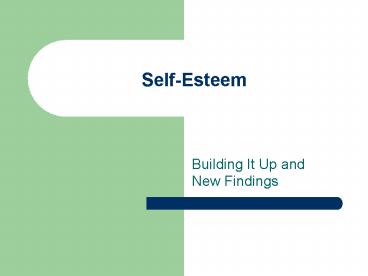Self-Esteem - PowerPoint PPT Presentation
1 / 17
Title:
Self-Esteem
Description:
Self-Esteem Building It Up and New Findings What is Self-Esteem? Difference between Self-Concept and Self- Esteem Self Concept Self -Esteem Levels of Self-Esteem ... – PowerPoint PPT presentation
Number of Views:439
Avg rating:3.0/5.0
Title: Self-Esteem
1
Self-Esteem
- Building It Up and New Findings
2
What is Self-Esteem?
Definitions and Types of Self-Esteem.
- Self-Esteem What you think and feel about
yourself. - Earned Self-Esteem obtained by individuals
through their accomplishments. Ex Score well on
a test. - Global Self-Esteem Sense of Pride in oneself
3
Difference between Self-Concept and Self- Esteem
- SelfConcept
- Self -Esteem
Selfconcept is the description of a person.
Description of his or her attributes or
roles. Example I am short. I have dark hair. I
am a student.
SelfEsteem is how the person feels or thinks
about those descriptions. Example I think being
taller would be better. I think my hair should be
light because all the female stars have light
hair. I am a good student.
4
Levels of Self-Esteem
- High - usually more comfortable with appearance
and abilities. Have more confidence. Less likely
to get into trouble. - Low less likely to be comfortable with
appearance and life. Have less confidence. More
likely to get into trouble. - Pseudo give the appearance of having high
self-esteem while inside doubts rage.
5
When to Begin
- With parents at home during childhood
- Continues through adolescence and adulthood.
- Can change through these period.
6
What can parents do?
- Parents can begin building self-esteem in their
children by instilling a sense of
- Security
- Belonging
- Identity
- Purpose
- Personal Competence
7
Security and Belonging
- Security
- Child knows they are safe.
- Knows the rules and rules are enforced
consistently. - Spend quality time with the child.
- These help to build trust and responsibility.
- Belonging
- Child feels that he or she is part of the family.
- Is encouraged to help others inside and out side
the home. Examplevolunteering in the community.
8
Identity and Purpose
- Identity
- Make them feel like an important person.
- Provide love and acceptance.
- Make aware of strengths and weaknesses.
- Purpose
- Have expectations for your child
- Set realistic goals
- Help them develop and expand their interest and
talents. - Have faith and confidence in them
9
Personal Competence
- When setting goals come up with a plan of action
on how to reach the goal. - Always encourage and support
- Always give feedback about progress
10
Other characteristics that help build good
self-esteem
- Imagination
- Sense of Humor
- Helping those nearest you
- Rewarding yourself
- Aim for goals
- Hanging in there
- Accept your limits
- Expect to be healthy
- Faith in the Future
- Know that you cant change all things
- Be a good friend to yourself.
- Overcome the negative thoughts and opinions.
11
Caution Harmful to Self-Esteem
- Having no love, encouragement, support
- Having no connection to the family or a group
- Inconsistence
- Fear
- Always putting down, embarrassing, criticizing
- Having no purpose
12
Self-Esteem
- Education
- New Findings
13
Self-Esteem and Schools
- Began with the 1954 case of Brown vs. Board of
Education. - Is changing how it is being used in the schools
- Literature read before 1996 Most stated that a
higher self esteem would bring higher academic
success. - Literature read after 1998 Most stated that self
esteem had no correlation to academic success.
14
After all its by success, that you build
self-esteem. Sister Helen Struder, Principal of
Holy Angels School in Chicago
15
New Findings
- True or False
- Boys have higher self-esteem than girls
- Most violent teens have low self-esteems.
- Blacks have low self-esteem.
16
Ending Thoughts
- There are many aspects that make up and can harm
self-esteem along a persons life path. - More research is being done and more is needed to
be done to learn how self-esteem changes from age
to age, gender to gender, and culture to culture. - The pendulum is swing with regards to self-esteem
curriculum in the schools.
17
References
- Branden, N. (1995). Six Pillars of Self-Esteem.
New York Bantam - Klare, J. (1989). Looking Good Self-Esteem.
Florida Rourke Publications, Inc. - Palladino, C. (1989). Developing Self-Esteem A
Positive Guide for Personal Success. California
Crisp Publications, Inc. - Reasoner, R. (1982). Building Self-Esteem
Parents Guide. California Consulting
Psychologists Press, Inc. - Shokrail, N. (1998, January). The Self-Esteem
Fraud Feel-good education does not lead to
academic success. USA Today, 66-68. - Stevenson, H. (1996, January). Self-Esteem The
Myth of Feeling Good About Oneself. USA Today,
80-81.































